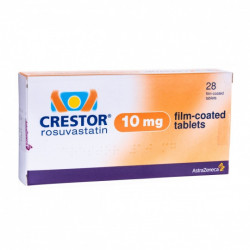Crestor (rosuvastatin) Coupons, Discounts & Cost
Crestor (rosuvastatin) is a drug that is used to treat high cholesterol levels. One way to save money on the Crestor (rosuvastatin) retail cost regardless of income and insurance status is to use Crestor (rosuvastatin) coupons or discount cards from RXCoupons. Use our Crestor (rosuvastatin) coupons at your online pharmacy and receive up to 75% off the sale price each time you refill your prescription.
What is Crestor (rosuvastatin)?
Crestor (rosuvastatin) is a drug that is used to treat high cholesterol levels. It belongs to the pharmacological group of cholesterol-lowering statin drugs.
In what cases should I take Crestor (rosuvastatin)?
The drug is given in the following cases: - Treatment of homozygous familial hypercholesterolemia; - Hypertriglyceridemia. - Treatment of atherosclerosis in patients who need to reduce total cholesterol concentration. - Primary prevention of major cardiovascular events (heart attack, stroke, arterial revascularization) in adult patients.
What should I know about Crestor (rosuvastatin) contraindications?
Crestor main contraindications include: - Liver disease, including persistent elevation of serum transaminases; - Simultaneous treatment with cyclosporine; - Lactase deficiency, lactose intolerance or glucose-galactose malabsorption; - Age up to 18 years; - Pregnancy, breastfeeding (lactation); - Hypersensitivity to the drug.
Additional contraindications for daily doses of 5, 10, 20 or 40 mg: - Renal impairment; - Myopathy; - Excessive alcohol consumption; - Hypothyroidism; - Concomitant use of a fibrate;
Crestor should be used with caution (under medical supervision) if the following conditions/diseases are present: uncontrolled seizures, liver disease, hypotension, sepsis, endocrine, metabolic and electrolyte disturbances, injuries, elderly patients (from 65 years).
How should I use Crestor (rosuvastatin)?
Crestor is taken orally, regardless of food intake and at any time of the day. The tablets should be swallowed whole (do not crush) with water. The dose of Crestor should be set individually.
The recommended initial daily dose for patients who start taking Crestor should be 5 or 10 mg, 1 time per day. The starting dose should be selected according to the individual cholesterol concentrations and the potential risk of development of cardiovascular complications and side effects. If necessary, the dose may be increased after 4 weeks of treatment. Due to the high risk of side effects, the dose may be increased to 40 mg only in patients with severe hypercholesterolemia and at high risk of developing cardiovascular complications (especially in patients with familial hypercholesterolemia). Careful monitoring is recommended for patients taking Crestor at a dose of 40 mg. The daily dose of 40 mg is not recommended for patients who start the therapy and those with moderate renal impairment.
Patients with severe renal insufficiency should not use this drug. Patients with moderate or mild renal insufficiency and elderly patients may not change the dose.
What should I know about Crestor (rosuvastatin) side effects?
Central nervous system: dizziness, headache, memory loss, polyneuropathy.
Immune system: hypersensitivity reactions, angioedema.
Respiratory system: shortness of breath, cough.
Urinary system: proteinuria (changes in the amount of protein in the urine occur in less than 1% of patients treated with Crestor), hematuria.
Endocrine system: type 2 diabetes mellitus.
Digestive tract: nausea, diarrhea, constipation, stomach pain, pancreatitis, jaundice, hepatitis.
Musculoskeletal system: myalgia, arthralgia, myopathy, myositis (when receiving doses higher than 20 mg), rhabdomyolysis.
Skin reactions: rash, pruritus, urticaria, Stevens-Johnson syndrome.
Other reactions: thyroid dysfunctions, asthenic syndrome, peripheral edema, depression, sexual dysfunction, sleep disorders, including insomnia and nightmares.
Crestor (rosuvastatin) special instructions and precautions
Patients taking high doses of the drug (40 mg) may suffer from proteinuria caused by renal tubular dysfunction (usually transient).
It is necessary to consult a doctor in case of muscle pain, muscle weakness or cramps, especially in combination with fever and malaise.
Care must be taken during treatment, especially when driving or performing work associated with high concentration of attention and speed of psychomotor reactions (increased risk of dizziness).

